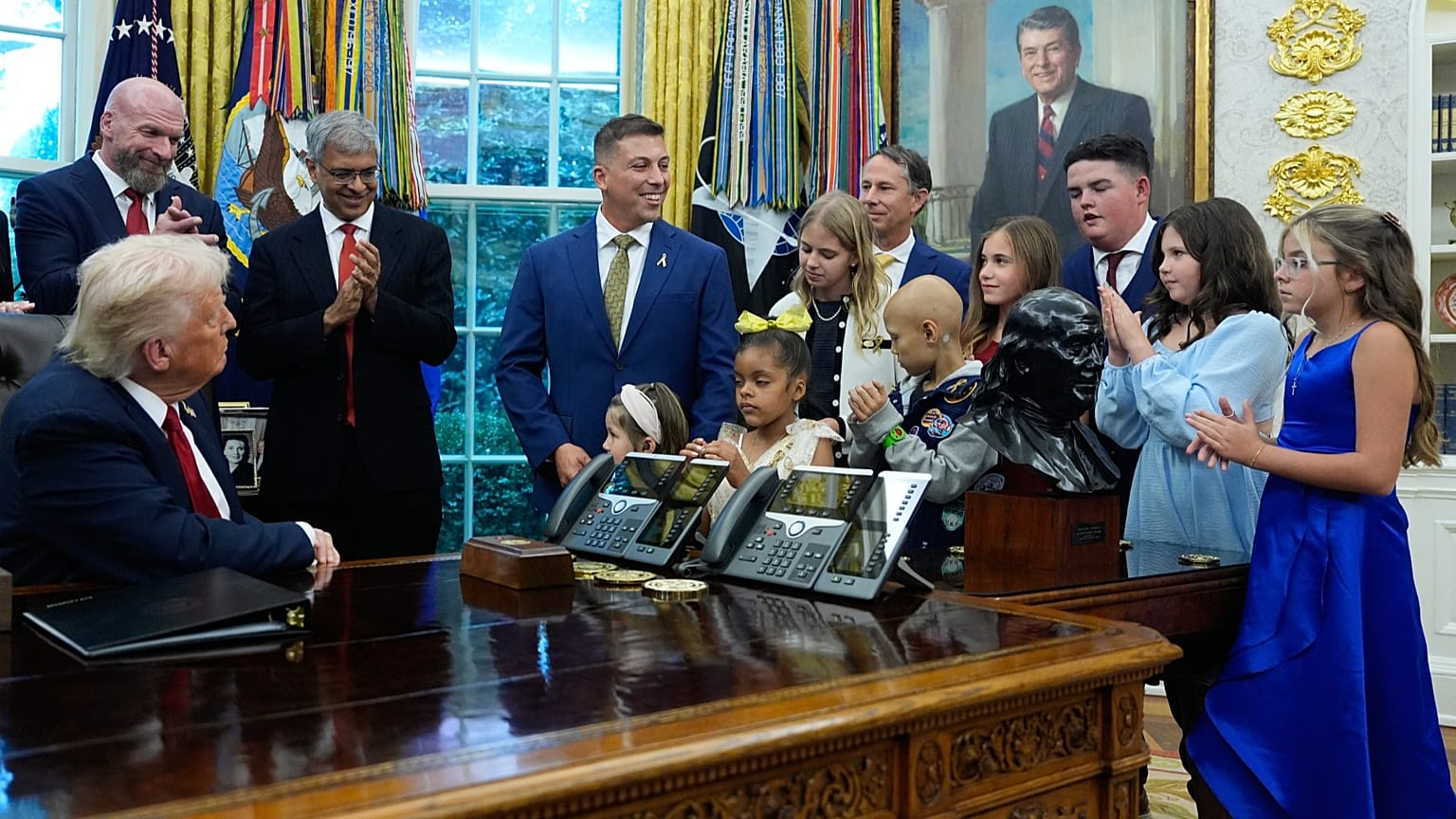Health
Trump Signs Executive Order Boosting AI in Pediatric Cancer Fight

President Donald Trump has signed an executive order aimed at harnessing artificial intelligence (AI) to enhance efforts against pediatric cancer. The initiative introduces an additional $50 million in funding for the Childhood Cancer Data Initiative, which was originally established during his first term in office. This new funding is intended to improve data collection and analysis, enhance diagnostic processes, expedite clinical trials, and bolster prevention strategies.
In a statement made in the Oval Office, Trump emphasized the potential of AI, stating, “We’re going to hook up the artificial intelligence with all of the other things that we have at hand.” He expressed optimism about the advancements that could be achieved, particularly for children battling cancer: “You’re all going to be better very soon,” he told young cancer survivors present during the announcement.
While the funding aims to significantly enhance pediatric cancer research, it comes at a time when broader cuts to federal science budgets have raised concerns. These cuts include the termination of grants for longstanding pediatric cancer research networks, limiting resources for critical studies.
The American Cancer Society has noted that although childhood cancer is relatively rare, it remains the leading cause of disease-related death after infancy among children in the United States. Projections indicate that about 9,550 children will be diagnosed with cancer in 2025. Despite improvements in survival rates—mortality has decreased by over 50 percent since 1975—the incidence of pediatric cancer has been rising since the 1970s. Globally, approximately 400,000 children and adolescents under the age of 19 are diagnosed with cancer each year, according to the World Health Organization (WHO).
The new funding doubles the National Institutes of Health (NIH) commitment to the Childhood Cancer Data Initiative, bringing total investment to $100 million. However, critics point out that this increase is overshadowed by significant cuts to federal science funding that have occurred under Trump’s administration.
In recent years, numerous scientists have been removed from federal payrolls, and hundreds of millions of dollars in grants—including those supporting vital pediatric cancer research—have been cancelled. For instance, the Pediatric Brain Tumor Consortium, which has provided access to experimental treatments for over 25 years, was informed in August that it would no longer receive federal support.
Furthermore, earlier budget proposals had suggested drastic reductions in funding for the National Cancer Institute, with potential cuts exceeding a third of its budget still being discussed. The American Cancer Society Cancer Action Network has warned that such reductions could severely impede progress in reducing cancer-related mortality and suffering among children.
As the initiative develops, specific details regarding the technologies and companies involved remain unclear, with White House officials stating that discussions are ongoing. Trump’s commitment to making AI technology widely accessible signifies a hopeful step towards improving outcomes in pediatric cancer care, yet the landscape of funding and research continues to be fraught with challenges.
-

 Top Stories3 months ago
Top Stories3 months agoTributes Surge for 9-Year-Old Leon Briody After Cancer Battle
-

 Entertainment4 months ago
Entertainment4 months agoAimee Osbourne Joins Family for Emotional Tribute to Ozzy
-

 Politics4 months ago
Politics4 months agoDanny Healy-Rae Considers Complaint After Altercation with Garda
-

 Top Stories4 months ago
Top Stories4 months agoIreland Enjoys Summer Heat as Hurricane Erin Approaches Atlantic
-

 World5 months ago
World5 months agoHawaii Commemorates 80 Years Since Hiroshima Bombing with Ceremony
-

 Top Stories3 months ago
Top Stories3 months agoNewcastle West Woman Patricia Foley Found Safe After Urgent Search
-

 Top Stories5 months ago
Top Stories5 months agoFianna Fáil TDs Urgently Consider Maire Geoghegan-Quinn for Presidency
-

 World5 months ago
World5 months agoCouple Convicted of Murdering Two-Year-Old Grandson in Wales
-

 World5 months ago
World5 months agoGaza Aid Distribution Tragedy: 20 Killed Amid Ongoing Violence
-

 World5 months ago
World5 months agoAristocrat Constance Marten and Partner Convicted of Infant Murder
-

 Top Stories4 months ago
Top Stories4 months agoClimbing Errigal: A Must-Do Summer Adventure in Donegal
-

 Top Stories4 months ago
Top Stories4 months agoHike Donegal’s Errigal Mountain NOW for Unforgettable Summer Views








